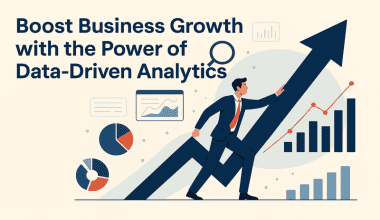Summary: A career in research analysis is exciting! Learn the key skills and education you’ll need to succeed. Discover how internships and a strong portfolio can jumpstart your journey to becoming a Research Analyst.
Introduction
One of the most prominent job roles growing in demand in the market is a Data Analyst, Data Scientist and relevant role of Research Analyst. A Research Analyst is responsible for conducting research, analysing and investigating data focusing on market trends, finance, accounting, etc.
The job role requires you to manage quantitative data and analyse them logically for critical business decision-making. However, most of you will have a common question: How to become a Research Analyst? What does a Research Analyst do? What are the skills required?
In this blog, you will learn about the stages of becoming a Research Analyst, the skills, the average salary, and more.
Research Analyst Job Trends
While there are different types of Research Analysts, you need to know that Market Research Analysts are the highest in demand. They are the ones that help businesses to make intelligent business decisions and job roles will grow in the next decade.
By 2026, the growth in the job role for a Research Analyst would increase by 26%. Accordingly, there were 792,000 market Research Analyst jobs till 2021 and there will be an additional 150,000 more jobs by 2031.
Who is a Research Analyst?
A Research Analyst works with business organisations to understand them better and solve their business problems using the organisational data. As a Research Analyst, you must closely work with the organisation and its clients to understand their needs effectively.
Accordingly, you will be required to prepare reports based on the data you collect from the discussion and research. These reports will be used by the organisations’ decision-making body to form effective strategies for their business to progress in the market. You would also require strong analytical and communication skills as a Research Analyst.
What does a Research Analyst Do?
A Research Analyst is typically responsible for various tasks involving quantitative analysis, interpretation, finance/accounting, market research etc. Additionally, the responsibilities of a Research Analyst include the following:
- Creating graphs, charts and tables for leadership teams
- Analysing the results from previous years and the performances of the company
- Identifying future market trends and providing recommendations
- Developing recommendations for improving business activities and processes.
- Creating ad-hoc reports and identifying and driving improvements in business processes
- Communicating and collaborating with different teams to provide critical insights
- Understanding market needs and analysing data for effective decision-making
Types of Research Analysts
There are different types of Research Analysts and you must figure out which field you are most interested in. Although the finance industry uses Research Analysts rigorously, the job role is available across different sectors. Some of the standard job titles for Research Analysts are as follows:
- Market Research Analyst
- Operations Research Analyst
- Economic Research Analyst
- Equity Research Analyst
- Financial Analyst
How to become a Research Analyst?
While there is no designated process you may need to follow to become a Research Analyst, you may be willing to consider the following steps.
Education
You can start by obtaining a proper education in the fields of Data Science, Computer Science, Business or Finance or any other area of your choice.
A bachelor’s or a Master’s degree in a relevant field would help you progress as a Research Analyst. These courses will help you learn and develop skills in Python, R, and SQL programming languages, statistical analysis, data visualization, financial analysis, etc.
Certifications
Many professionals gain additional certifications as Research Analysts after completing their graduation or post-graduation courses. Additionally, the certificates allow recruiters to understand that you have the potential to take up challenging tasks.
Moreover, it helps develop skills and improve job opportunities by developing theoretical and practical knowledge. Accordingly, you can opt for the Wizard programme, a Data Science course for Professionals.
Internships
It may be challenging to find jobs right away after completing your degree course or certifications. However, the role of a Research Analyst might require some hands-on experience within the industry.
Accordingly, you need to search and opt for internship opportunities where you can work under industry experts and expand your practical knowledge in the job role. Significantly, Internships allow you to build your network and develop relationships with like-minded professionals.
Additionally, it prepares you for full-time employment in the industry and helps you get positive recommendations.
Also Read: How to get a Data Science Internship with no experience
Work as a Research Analyst
After passing through all the significant steps, it is time for you to land your dream job. By now, you have theoretical knowledge, practical experience and relevant skills which can help you get your job.
Moreover, working as a Research Analyst in promising organisations and a sector of your choice, you should ensure that you have a solid resume. Accordingly, your proficiency and experiences will reflect in your CV. Thus, make sure you include all your developments.
Research Analyst Skills
Being a Research Analyst will require you to possess several skills to use raw data, analyse it, and interpret it to provide meaningful insights. Effectively, the following are the Research Analyst skills that you will need:
- Statistical and mathematical modelling skills
- The capability of data collection and analysis of outcomes with accuracy and credibility
- Strong communication skills for interpreting findings
- Critical Thinking and Analytical Skills for identifying details
- Logical Reasoning Abilities
- Organisational skills
- Presentation Skills
Research Analyst Salary
The average Research Analyst salary in India stands at INR 5,00,000 per annum. However, considering specification, freshers, on average, earn INR 3,00,000 – 4,00,000 PA. On the other hand, an experienced Research Analysts salary stands at INR 6,00,000- 7,00,000 PA.
Accordingly, it is important to note that these average salaries may vary based on the industry you will be working in and the experience you have.
Also read: LinkedIn Data Scientist Salary Trend
Parting Thoughts
Hence, opting for a career as a Research Analyst provides you with an opportunity to carve out your niche in a booming market. Significantly, with increasing job vacancies for Research Analysts in the market, building a career path in this field will help you achieve success.
Furthermore, you should ensure that you have a degree in Data Science or certifications and practical experiences. It will benefit you in acquiring jobs and showcasing your skills in the market.
Frequently Asked Questions
What Education do I Need to Become a Research Analyst?
A bachelor’s degree in a relevant field is typically the entry point for becoming a Research Analyst. Popular majors include business, finance, economics, statistics, mathematics, and social sciences. Some employers may prefer a master’s degree, especially for advanced positions.
What Skills are Important for a Research Analyst Career?
Strong analytical and problem-solving skills are essential for Research Analysts. You’ll also need proficiency in data analysis and interpreting findings. Excellent communication and presentation skills are crucial for conveying complex information to both technical and non-technical audiences.
Additionally, attention to detail, accuracy, and the ability to work independently and as part of a team are valuable assets.
How Can I Gain Experience to Become a Research Analyst?
Internships are a great way to gain practical experience in research analysis. Look for opportunities related to your field of interest, such as research assistant positions or internships in finance, marketing, or data analysis departments.
Even volunteer work involving research and data analysis can be beneficial. Consider building a portfolio to showcase your research projects, analyses, and reports to potential employers.





